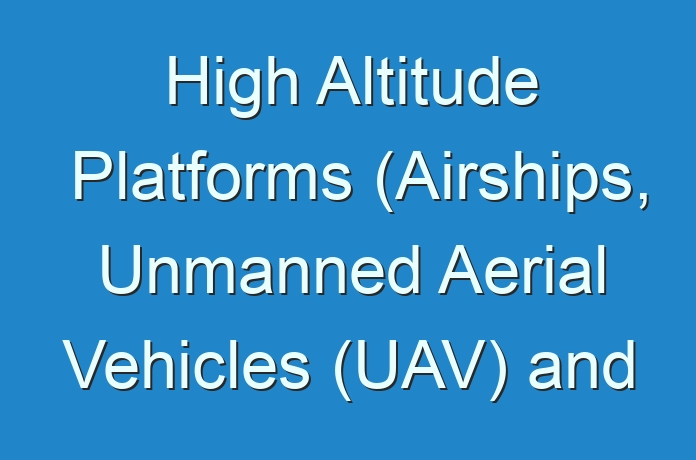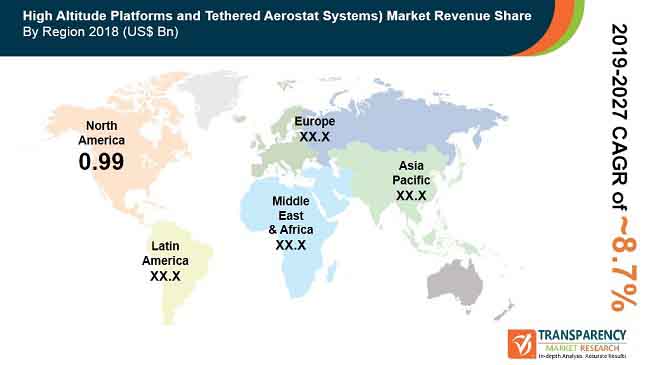
According to a new market report published by Transparency Market Research “High Altitude Platforms Market – Global Industry Analysis, Size, Share, Growth, Trends and Forecast 2019 – 2027,” the high altitude platforms (HAPs) market was valued at US$ 3.21 bn in 2018 and is estimated to reach US$ 6.80 bn by 2027, expanding at a CAGR of 8.7% from 2019 to 2027. North America accounted for the largest share, in terms of revenue, of the HAPs market in 2018. With high adoption of advanced UAV aircrafts and tethered aerostat systems, especially in the U.S., North America is expected to remain dominant throughout the forecast period.
Asia Pacific is projected to emerge as the fastest-growing market for HAPs during the forecast period, expanding at a CAGR of 10.0% from 2019 to 2027. The market growth of HAPs in Asia Pacific region is mainly driven by the strong and increasing expenditure in HAP-based surveillance systems in China, India, Southeast Asia, Japan, and South Korea. Another significant factor boosting market growth is the growing Internet penetration and increasing demand for high-speed wireless communication services.

For More Details, Request A Sample Report@ https://www.transparencymarketresearch.com/sample/sample.php?flag=S&rep_id=1282
High altitude platforms (HAPs) are airborne systems deployed at altitudes of more than 50,000 feet. These systems are typically deployed in the stratosphere layer applications such as surveillance systems, communication, and navigation. The most significant factor fuelling the growth of the HAPs market is the large competitive advantages of HAPs over satellite systems. HAPs offer lower system and maintenance costs than satellite systems. In addition, HAPs can be controlled more conveniently and require less installation time than satellite systems. Government & defense accounts for the largest share, in terms of revenue and adoption, of HAPs worldwide.
Thus, high investment on HAPs from countries such as the U.S., China, India, and Israel substantially contributes to the HAP market’s growth. On the basis of platform type, the global HAPs market is segmented into airships, UAV aircraft, and tethered aerostat systems. In 2018, the UAV aircraft segment accounted for the largest market share of over 71%, in terms of revenue, of the overall HAPs market. UAV aircraft are the costliest HAPs and provide the largest coverage areas. These aircraft are used in countries such as the U.S., China, Russia, Israel, Turkey, and France. Despite high costs, these aircraft have experienced strong demand from the aforementioned countries and hence the segment is anticipated to remain dominant throughout the forecast period.
On the basis of payloads, the global HAPs market is segmented into communication, surveillance systems, EO/IR imaging systems, and navigation systems. In 2018, the communication segment accounted for the largest share of around 38%, in terms of revenue, of the total HAPs market. Communication systems are the most integral for HAPs. Moreover, the segment is anticipated to hold its dominant position throughout the forecast period due to upcoming HAP-based wireless communication projects. The segment is projected to expand at a CAGR of 10.0% from 2019 to 2027. Furthermore, in terms of applications, the government & defense sector stood for the largest revenue share of over 70% of the total market. Due to high spending on HAP-based surveillance systems, the segment is expected to hold its dominant position in the coming years.
On the basis of geography, North America led the global high altitude platforms market in 2018, with a share of around 31% of the total market. High penetration of UAV aircraft, coupled with strong spending on other lighter-than-air (LTA) systems is the prime factor responsible for growth in this region.





